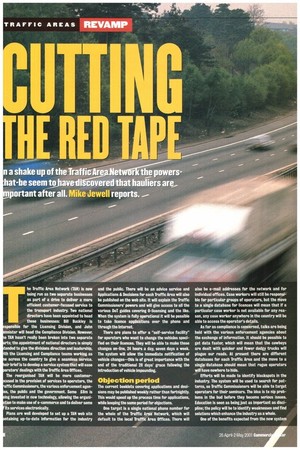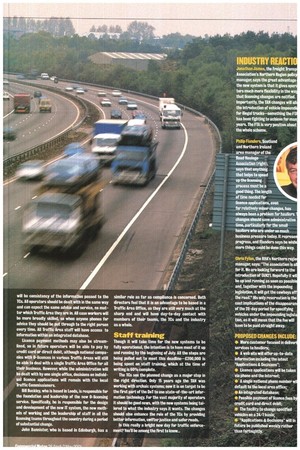n a shake up of the Traffic AreaNetwik the powershat-he seem t_phaveillieovered that hauliers are... ortant after all. Mike-Jewell reports.
Page 30

Page 31

If you've noticed an error in this article please click here to report it so we can fix it.
he Traffic Area Network (TAN) is now being run as two separate businesses as part of a drive to deliver a more efficient customer-focused service to the transport industry. Two national directors have been appointed to head these businesses: Bill Buckley is sponsible for the Licensing Division, and John nnister will head the Compliance Division. However, e TAN hasn't really been broken into two separate rts; the appointment of national directors is simply tended to give the divisions direction and leadership, ith the Licensing and Compliance teams working as e across the country to give a seamless service. eir brief is to develop a service system that will ease erators dealings with the Traffic Area Offices.
The reorganised TAN will be more customercused in the provision of services to operators, the • fflc Commissioners, the various enforcement agenes, the public and the government. Some .CBm is ing invested in new technology, allowing the organiton to make use of e-commerce and to deliver some its services electronically.
Plans are well developed to set up a TAN web site ntaining up-to-date information for the industry and the public. There will be an advice service and Applications & Decisions for each Traffic Area will also be published on the web site. It will explain the Traffic Commissioners' powers and will give access to all the various DoT guides covering 0-licensing and the like. When the system is fully operational it will be possible to take licence applications over the phone and through the Internet.
There are plans to offer a "self-service facility" for operators who want to change the vehicles specified on their licences. They will be able to make these changes on-line, 24 hours a day, seven days a week. The system will allow the immediate notification of vehicle changes—this is of great Importance with the end of the traditional 28 days' grace following the introduction of vehicle impounding.
Objection period
The current booklets covering applications and decisions may be published weekly rather than fortnightly. This would speed up the process time for applications, while keeping the same period for objections.
One target is a single national phone number for the whole of the Traffic Area Network, which will default to the local Traffic Area Offices. There will also be e-mail addresses for the network and for individual offices. Case workers will still be responsible for particular groups of operators, but the move to a single database for licences will mean that if a particular case worker is not available for any reason, any case worker anywhere in the country will be able to access the operator's details.
As far as compliance is concerned, talks are being held with the various enforcement agencies about the exchange of information. It should be possible to get data faster, which will mean that the cowboys are dealt with quicker and fewer dodgy trucks will plague our roads, At present there are different databases for each Traffic Area and the move to a single database should mean that rogue operators will have nowhere to hide.
Efforts will be made to identify blackspots in the industry. The system will be used to search for patterns, so Traffic Commissioners will be able to target operators for their seminars. The idea is to nip emblems in the bud before they become serious issues. Education is seen as being just as important as discipline: the policy will be to identify weaknesses and find solutions which enhance the industry as a whole.
One of the benefits expected from the new system will be consistency of the information passed to the [Cs. All operators should be dealt with in the same way and can expect the same advice and service, no matter which Traffic Area they are in. All case workers will be more broadly skilled, so when anyone phones for advice they should be put through to the right person every time. All Traffic Area staff will have access to information within an integrated database.
Licence payment methods may also be streamlined, so in future operators will be able to pay by credit card or direct debit, although national companies with 0-licences in various Traffic Areas will still be able to deal with a single Traffic Area Office for all their business. However, while the administration will be dealt with by one single office, decisions on individual licence applications will remain with the local Traffic Commissioners.
Bill Buckley, who is based in Leeds, is responsible for the foundation and leadership of the new 0-licensing service. Specifically, he is responsible for the design and development of the new IT system, the new methods of working and the leadership of staff in all the licensing teams throughout the country during a period of substantial change.
John Bannister, who is based in Edinburgh, has a similar role as far as compliance is concerned. Both directors feel that it is an advantage to be based in a Traffic Area Office, as they are still very much at the sharp end and will have day-to-day contact with members of their teams, the ICs and the industry as a whole.
Staff training
Though it will take time for the new systems to be fully operational, the intention is to have most of it up and running by the beginning of July. All the stops are being pulled out to meet this deadline—£200,000 is being spent on staff training, which at the time of writing is 60% complete.
The lts see the planned change as a major step in the right direction. Only 15 years ago the TAN was working with archaic systems; now it is on target to be the first part of the Doi to use state-of-the-art information technology. For the vast majority of operators it should be good news, with the new systems being tailored to what the industry says it wants. The changes should also enhance the role of the Ns by providing better information, swifter justice and safer roads.
Is this really a bright new day for traffic enforcement? You'll be among the first to know...
INDUSTRY REACTI
Jonathan James, the Freight Trans Association's Northern Region polic manager, says the great advantage the new system is that it gives ope tors much more flexibility in the wa that licensing changes are notified. Importantly, the TAN changes will all the introduction of vehicle impoundi for illegal trucks—something the FT has been fighting to achieve for man years. The FTA is very positive about the whole scheme.
Philip Flanders, Scotland and Northern Ireland area manager of the Road Haulage Association (right), says that anything that helps to speed up the licensing process must be a good thing. The length of time needed for licence applications, even for relatively minor changes, has always been a problem for hauliers. changes should save administrative time, particularly for the small hauliers who are under so much business pressure today. It represe progress, and Flanders says he wish more things could be done this way.
Chris Fylan, the RHA's Northern regio manager, says: "The association is al for it. We are looking forward to the introduction of TAN21. Hopefully it wil be up and running as soon as possibl and, together with the impounding legislation, it will get the cowboys off the road." His only reservation is the cost implications of the disappearan of the 28-day period for specifying vehicles under the impounding legisl tion, as it will mean that the fee will have to be paid straight away.
PROPOSED CHANGES INCLUDE:
• More customer focused in delive services to hauliers; • A web site will offer up-to-date information including the latest "Applications & Decisions"; • Licence applications will be taken via phone and the Internet; • A single national phone number wi default to the local area office; • An integrated database; • Possible payment of licence fees b credit card and direct debit; • The facility to change specified vehicles on a Ma basis; • "Applications & Decisions" will In future be published weekly rather than fortnightly.
































































































